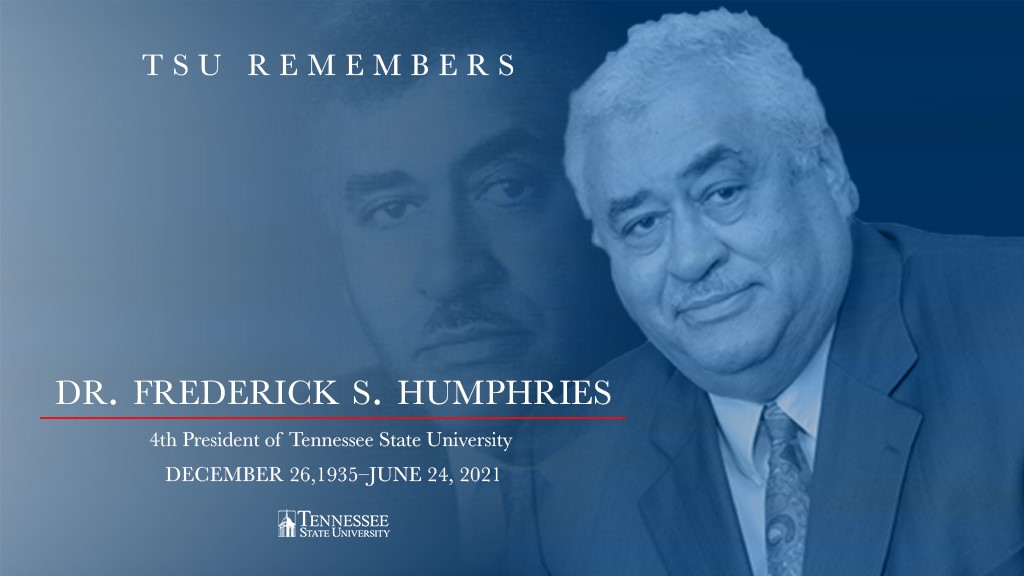By Lucas Johnson
NASHVILLE, Tenn. (TSU News Service) – Dr. Frederick Stephen Humphries, President Emeritus of Tennessee State University and Florida A&M University, is being remembered as a stalwart of higher education and staunch advocate for historically black colleges and universities (HBCUs).

The trailblazing educator, who was TSU’s fourth president, passed away on June 24 at the age of 85. Humphries remained close to TSU and continued his financial support of the institution. In 2017, President Glenda Glover presented him with a Special Presidential Recognition during TSU’s homecoming.
“Dr. Humphries was a stalwart of higher education, and more importantly a staunch advocate for historically black colleges and universities (HBCUs),” said TSU President Glenda Glover. “He demanded that HBCUs have their rightful place as leading institutions and this was evident during his leadership of the historic merger of the University of Tennessee at Nashville and TSU.”
Humphries grew up in the small town of Apalachicola, Florida, where he attended the all-black Wallace M. Quinn High School and was one of only nine graduates in the class of 1953. There, undoubtedly, the seed was planted for the greatness he would achieve in education.
Humphries realized his abilities, and never looked back. Following high school, he enrolled at Florida A&M University and went on to earn the Bachelor of Science degree magna cum laude in chemistry in 1957. He was also a distinguished military science graduate, and reportedly the first black officer to be commissioned into the Army Security Agency (Army Intelligence Branch). After serving in the Army for two years, Humphries entered the University of Pittsburgh in 1959 as a teaching assistant in chemistry, became a graduate research fellow the next year, and earned his Ph.D. in physical chemistry in 1964, the first African American to receive a Ph.D. in that discipline from the University of Pittsburgh.
In 1974, Humphries was named president of Tennessee State University. While at TSU, his excellent administration skills resulted in recruitment of top faculty, better academic programs, increased enrollment and quality of students, and expanded scholarships and support activities.
During his time at TSU, Humphries, who was quite vocal during the landmark court case, insisted on the predominance of TSU over UTN. This ultimately led to the merger of TSU and UTN, with TSU becoming the surviving institution. Historians say the posture and eloquence of Humphries in court is largely held as being responsible for the court decision, along with the presentation of attorney Avon Williams, and the efforts of Tennesseans for Justice in Higher Education. Between 1980 and 1985, Humphries and his staff gave leadership to the merged TSU, and began serving an increasingly larger portion of the Nashville community.
Humphries went on to become president of Florida A&M University in 1985, where he excelled for six years, gaining increased recognition on the state, national, and international levels. Florida A&M later conferred upon him the President Emeritus title.
Humphries was a member of Alpha Phi Alpha Fraternity, Inc., the American Association of Higher Education, the American Association for the Advancement of Science, the American Chemical Society, and the American Association of Minority Research Universities, just to name a few.
His honors and awards include the Drum Major for Justice Award in Education by the Southern Christian Leadership Conference; President’s Award for Excellence in Higher Education by 100 Black Men of America, Inc.; Leadership Grant by the Prudential Life Insurance Company of America Foundation; and many others. Among Humphries’ most memorable awards are the Distinguished Alumnus Award presented by the faculty of the College of Arts and Sciences at the University of Pittsburgh; the United Bicentennial Medal of Distinction by the University of Pittsburgh on its 200th anniversary; the Thurgood Marshall Educational Achievement Award by Johnson Publishing Company for the most outstanding contributions to education; and “Floridian of the Year” by the Orlando Sentinel, the first African American to be honored with this award
Department of Media Relations
Tennessee State University
3500 John Merritt Boulevard
Nashville, Tennessee 37209
615.963.5331
About Tennessee State University
Founded in 1912, Tennessee State University is Nashville’s only public university, and is a premier, historically black university and land-grant institution offering 39 bachelor’s degree programs, 24 master’s degree programs, and eight doctoral degrees. TSU is a comprehensive research intensive institution with a R-2 Carnegie designation, and has a graduate school on its downtown Avon Williams Campus, along with the Otis Floyd Nursery Research Center in McMinnville, Tennessee. With a commitment to excellence, Tennessee State University provides students with a quality education in a nurturing and innovative environment that prepares them as alumni to be global leaders in every facet of society. Visit the University online at tnstate.edu.















